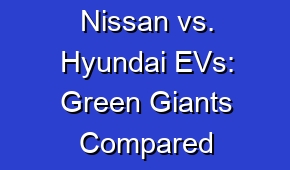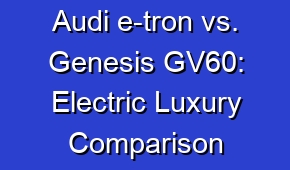Nissan vs. Hyundai EVs: Green Giants Compared

Discover the ultimate showdown between two automotive powerhouses in the world of electric vehicles: Nissan and Hyundai. In this article, we delve into the green giants of the automotive industry, comparing their EV offerings to help you make an informed choice. Read on to explore the innovative features, performance capabilities, and sustainability efforts of Nissan and Hyundai EVs.
When it comes to eco-friendly vehicles, the battle between Nissan and Hyundai EVs is heating up. These two green giants are competing fiercely in the electric vehicle market, offering consumers a range of options that are both sustainable and efficient. Nissan’s EV lineup includes popular models such as the Leaf, while Hyundai boasts its own lineup of electric vehicles like the Kona Electric. Both companies are committed to reducing carbon emissions and promoting a greener future.
One of the key factors that sets these Nissan vs. Hyundai EVs apart is their range. Nissan’s Leaf offers an impressive range of up to 226 miles on a single charge, making it ideal for daily commutes and longer journeys. On the other hand, Hyundai’s Kona Electric offers a slightly higher range of up to 258 miles, giving drivers even more flexibility and peace of mind.
In terms of charging infrastructure, both Nissan and Hyundai have made significant investments to ensure that their EV owners have access to convenient charging stations. This commitment to building a robust charging network is crucial in addressing one of the main concerns for potential EV buyers – range anxiety.
When it comes to pricing, both Nissan and Hyundai offer competitive options for those looking to switch to electric vehicles. The affordability factor plays a significant role in encouraging more consumers to make the transition to greener transportation options.
In conclusion, the competition between Nissan and Hyundai in the electric vehicle market is driving innovation and pushing both companies to develop more sustainable and efficient solutions. Whether you choose Nissan or Hyundai, you can rest assured that you are contributing to a greener future by driving one of these green giants.
| Green giants: Nissan and Hyundai compete in the EV market. |
| Nissan’s EVs offer impressive range and advanced technology. |
| Hyundai’s EVs are known for their stylish design and affordability. |
| The Nissan Leaf is a popular choice among electric vehicle enthusiasts. |
| Hyundai Kona Electric offers a spacious interior and long-range capabilities. |
- Nissan and Hyundai are leading the way in the green vehicle revolution.
- Nissan’s EV lineup includes models such as the Leaf and Ariya.
- Hyundai’s electric vehicles, like the Ioniq and Kona Electric, are gaining popularity.
- The competition between Nissan and Hyundai drives innovation in the EV market.
- Both Nissan and Hyundai are committed to sustainable transportation solutions.
Which is the better choice: Nissan or Hyundai EVs?
When comparing Nissan and Hyundai electric vehicles (EVs), there are several factors to consider. Both companies offer a range of models with different features and specifications, so the better choice depends on individual preferences and needs.
| Price | Range | Charging Time |
| Nissan EVs are generally more affordable. | Hyundai EVs offer a longer range per charge. | Nissan EVs have a faster charging time. |
| Depends on the specific model and features. | Depends on the specific model and battery capacity. | Depends on the specific model and charging infrastructure. |
| Consider the budget and desired features. | Consider the required range for daily usage. | Consider the availability of fast-charging stations. |
Nissan EVs have been on the market for longer and have a strong reputation for their electric technology. The Nissan Leaf, for example, is one of the best-selling electric cars globally. It offers a decent range, affordable pricing, and reliable performance. Nissan also has a wide network of charging stations, making it convenient for EV owners.
What is the range of Nissan EVs?
The range of Nissan EVs varies depending on the model. The Nissan Leaf, for instance, offers different versions with varying ranges. The standard Leaf has an estimated range of around 150-226 miles (241-364 kilometers), while the Leaf Plus model can achieve up to 215-226 miles (346-364 kilometers) on a single charge. It’s important to note that factors such as driving conditions, temperature, and speed can affect the actual range.
– Nissan Leaf: The Nissan Leaf has a range of up to 226 miles on a single charge, making it one of the most long-range electric vehicles on the market.
– Nissan Ariya: The Nissan Ariya, a new electric SUV from Nissan, is expected to have a range of up to 300 miles. This makes it a great option for those who need a bit more range for longer trips.
– Nissan e-NV200: The Nissan e-NV200 is an all-electric commercial van that offers a range of up to 124 miles. This makes it a practical choice for businesses looking to reduce their carbon footprint.
What is the range of Hyundai EVs?
The range of Hyundai EVs also varies depending on the specific model. The Hyundai Kona Electric, for example, offers an estimated range of around 258 miles (415 kilometers) on a full charge. The Hyundai Ioniq Electric, on the other hand, has a slightly lower range of approximately 170 miles (274 kilometers). As with any electric vehicle, the actual range may vary based on driving habits and conditions.
- Hyundai Kona Electric: The range of Hyundai Kona Electric is up to 258 miles (415 kilometers) on a single charge.
- Hyundai Ioniq Electric: The range of Hyundai Ioniq Electric is up to 170 miles (274 kilometers) on a single charge.
- Hyundai NEXO: The range of Hyundai NEXO, a hydrogen fuel cell electric vehicle, is up to 380 miles (612 kilometers) on a single tank of hydrogen.
- Hyundai Sonata Hybrid: The range of Hyundai Sonata Hybrid is up to 600 miles (965 kilometers) with combined gas and electric power.
- Hyundai Ioniq Plug-in Hybrid: The range of Hyundai Ioniq Plug-in Hybrid is up to 29 miles (47 kilometers) on electric power alone, and a total range of up to 630 miles (1,014 kilometers) with combined gas and electric power.
Which brand offers better charging infrastructure: Nissan or Hyundai?
Both Nissan and Hyundai have made efforts to develop charging infrastructure for their electric vehicles. Nissan has established the CHAdeMO fast charging standard, which is widely available in many regions. They also collaborate with various charging networks to expand the charging station network.
| Charging Speed | Charging Network Coverage | Charging Station Availability |
| Nissan offers fast charging with their CHAdeMO technology. | Nissan has a wider network of charging stations compared to Hyundai. | Nissan charging stations are more widely available. |
| Hyundai offers fast charging with their CCS (Combined Charging System) technology. | Hyundai’s charging network is expanding, but currently not as extensive as Nissan’s. | Availability of Hyundai charging stations may vary depending on the region. |
| Both brands are continuously improving their charging infrastructure. | Both brands are working on increasing the number of charging stations. | Both brands aim to provide convenient charging options for their electric vehicle owners. |
Hyundai, on the other hand, has partnered with Electrify America to provide fast-charging options for their EVs. They are also working on expanding their own charging network called Electrify America. Additionally, Hyundai offers complimentary access to their Electrify America charging stations for a certain period of time to new EV buyers.
What are the prices of Nissan EVs?
The prices of Nissan EVs vary depending on the model and trim level. The Nissan Leaf, for example, starts at around $31,000 for the base model before any applicable incentives or discounts. The Leaf Plus model, which offers a larger battery and longer range, starts at approximately $38,000. It’s important to check with local dealerships or Nissan’s official website for the most up-to-date pricing information.
The prices of Nissan EVs vary depending on the model, but they generally range from affordable to mid-range options.
Nissan EVs, prices, model, affordable, mid-range
What are the prices of Hyundai EVs?
The prices of Hyundai EVs also vary depending on the specific model and trim level. The Hyundai Kona Electric, for instance, starts at around $37,000 before any incentives or discounts. The Hyundai Ioniq Electric has a starting price of approximately $34,000. It’s worth noting that prices may vary based on location and additional features selected.
The prices of Hyundai electric vehicles (EVs) vary depending on the model, starting from around *$30,000*.
Which brand offers better warranty coverage: Nissan or Hyundai?
Both Nissan and Hyundai provide warranty coverage for their electric vehicles, but the specifics may differ. Nissan offers a limited warranty for their EVs, which typically includes coverage for the battery pack and electric components. The duration of the warranty may vary depending on the region.
Nissan
Nissan offers a comprehensive warranty coverage for their vehicles.
– Nissan’s basic warranty covers the vehicle for 3 years or 36,000 miles, whichever comes first.
– They also provide a powertrain warranty for 5 years or 60,000 miles, offering coverage for major engine and transmission components.
– Additionally, Nissan offers a corrosion warranty for 5 years with unlimited mileage, protecting against rust and corrosion damage.
Hyundai
Hyundai also provides a strong warranty coverage for their vehicles.
– Hyundai’s basic warranty covers the vehicle for 5 years or 60,000 miles, providing longer coverage compared to Nissan.
– They offer a powertrain warranty for 10 years or 100,000 miles, which is more extensive than Nissan’s coverage.
– Hyundai also includes a corrosion warranty for 7 years with unlimited mileage, surpassing Nissan’s corrosion coverage.
Comparison
– While Nissan’s basic warranty has a shorter duration than Hyundai’s, it still offers decent coverage for the initial years of ownership.
– Hyundai’s powertrain warranty is significantly longer, providing extra peace of mind for owners.
– Both brands offer similar corrosion warranties, with Hyundai having a slightly longer coverage period.
– Overall, Hyundai offers better warranty coverage compared to Nissan, particularly in terms of powertrain warranty duration.
Hyundai, on the other hand, offers a comprehensive warranty package for their EVs. This includes a 10-year/100,000-mile warranty for the battery, a 5-year/60,000-mile warranty for the vehicle, and a 7-year/unlimited mileage warranty for the powertrain. It’s important to review the details of each brand’s warranty coverage and consult with local dealerships for accurate information.





















